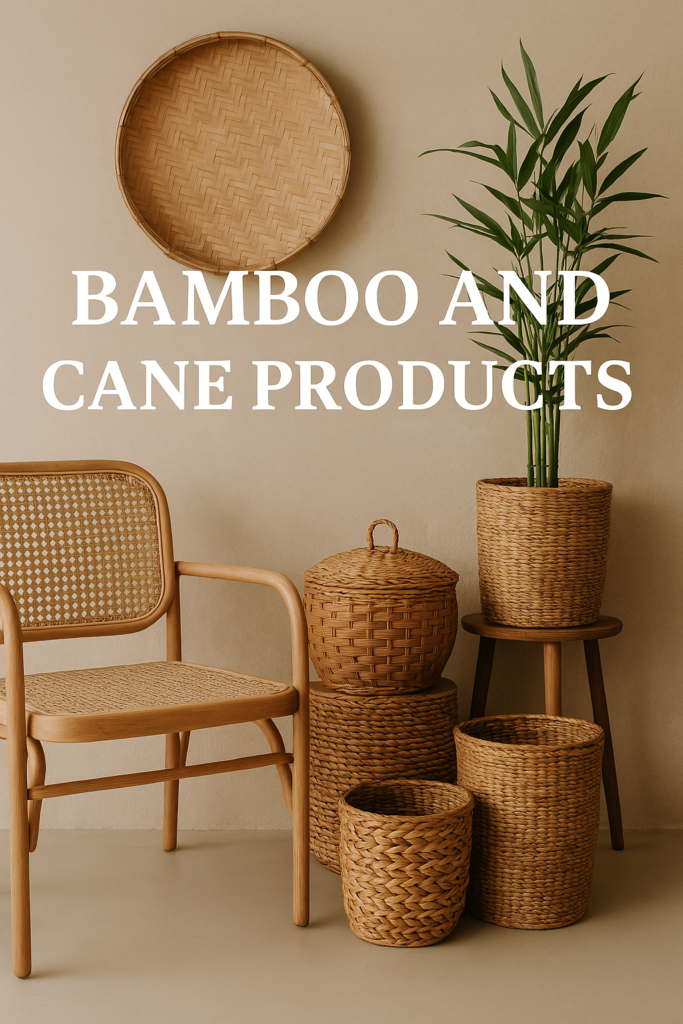Bamboo and Cane Products in Bangladesh: A Tradition of Craftsmanship and Sustainability

Bangladesh, a country rich in natural resources and cultural heritage, has long been known for its traditional handcrafts. Among these, bamboo and cane products stand out for their eco-friendliness, aesthetic appeal, and deep-rooted cultural significance. These natural materials have been part of the Bangladeshi lifestyle for centuries, serving both functional and decorative purposes.
The Abundance of Bamboo and Cane
Bangladesh’s humid, tropical climate is ideal for the growth of bamboo and cane. These materials are found abundantly in the Chittagong Hill Tracts, Sylhet, Mymensingh, and Rajshahi regions. Bamboo is fast-growing and renewable, making it an environmentally sustainable option, while cane is valued for its flexibility and durability.
Traditional Uses
Historically, bamboo and cane have been used in rural and urban households across Bangladesh. Some of the most common traditional uses include:
- Furniture: Chairs, stools, tables, and beds made from cane and bamboo are lightweight yet strong.
- Household Items: Baskets, trays, mats, and storage containers made from bamboo and cane are popular for their utility and natural look.
- Construction: Bamboo is widely used in rural architecture, particularly for scaffolding, fences, walls, and roofing.
- Musical Instruments: Flutes, drums, and other traditional instruments are often crafted using bamboo.
- Decorative Art: Artisans create intricate wall hangings, lampshades, and showpieces from finely woven bamboo and cane.
A Thriving Cottage Industry
The bamboo and cane craft industry in Bangladesh operates largely as a cottage industry, employing thousands of rural artisans, particularly women. These artisans inherit their skills through generations, contributing to family income while preserving cultural traditions.
Some of the major hubs for bamboo and cane craftsmanship include:
- Rangamati and Bandarban in the Chittagong Hill Tracts
- Sylhet, especially in areas like Bishwanath and Jaintapur
- Tangail and Narsingdi, known for their diversified handcraft production
Export Potential and Global Demand
In recent years, there has been a growing international demand for eco-friendly and sustainable products. Bamboo and cane products from Bangladesh are gaining popularity in global markets, especially in Europe, the Middle East, and North America.
Exported items typically include:
- Handcrafted furniture
- Decorative home accessories
- Bamboo blinds and screens
- Garden items like plant holders and outdoor chairs
Organizations like the Bangladesh Handicrafts Manufacturers and Exporters Association (BANGLACRAFT) and SME Foundation play a vital role in promoting these products abroad and supporting artisans with training and resources.
Challenges Faced by the Industry
Despite its potential, the bamboo and cane product industry in Bangladesh faces several challenges:
- Lack of Raw Material Management: Unplanned harvesting and limited plantations of bamboo and cane can lead to shortages and quality issues.
- Limited Access to Modern Technology: Most artisans still use traditional methods, limiting production capacity and design innovation.
- Market Access Issues: Artisans in remote areas struggle to connect with national and international buyers.
- Inadequate Government Support: Although some programs exist, many artisans remain unaware or unable to access government assistance.
What’s Being Done to Help?
Several organizations and government initiatives are stepping in:
- Skill development workshops for modern designs
- Micro-finance support for female entrepreneurs
- Exposure at local and global trade fairs
- Encouraging bamboo plantations for sustainability
Government and NGO Initiatives
Various initiatives have been launched to boost this traditional industry:
- Training programs for skill development and modern design adaptation.
- Micro-financing options provided by NGOs to support women artisans.
- Trade fairs and expos, such as the National SME Fair and Dhaka International Trade Fair, where artisans showcase their products.
The Path Forward: Sustainability and Innovation
The future of bamboo and cane products in Bangladesh lies in blending traditional craftsmanship with modern innovation. By introducing new designs, improving quality standards, and using digital marketing platforms, these products can reach a wider global audience.
Furthermore, promoting sustainable harvesting practices and plantation programs will ensure a long-term supply of raw materials without harming the environment.
Bamboo and Cane Products in Bangladesh: A Legacy of Sustainability and Style
A Timeless Craft Rooted in Nature
In the heart of Bangladesh’s rural and hill regions, a quiet revolution has long been underway—powered by bamboo and cane. These humble materials, woven into the very culture of the land, are now finding their way into modern homes, designer studios, and even export markets.
From stylish handcrafted furniture to eco-friendly home décor, bamboo and cane products from Bangladesh are sustainable, versatile, and full of stories worth telling.
The Natural Abundance of Bamboo and Cane in Bangladesh
Bangladesh’s tropical climate offers perfect growing conditions for bamboo and cane plantations, especially in:
- Chittagong Hill Tracts (Rangamati, Bandarban)
- Sylhet region
- Mymensingh and Rajshahi
These regions supply raw materials for everything from furniture to musical instruments. Bamboo grows incredibly fast, making it an eco-friendly and renewable resource.
️ Traditional Uses That Still Shine Today
Some of the most cherished and functional items crafted from bamboo and cane include:
- Cane furniture: Sofas, chairs, tea tables, rocking chairs
- Baskets and trays: Used for storage, shopping, and decoration
- Bamboo blinds and mats: Cooling and aesthetic home accessories
- Home décor: Lampshades, wall hangings, and planters
- Construction materials: Rural homes and fences
These products are known for being lightweight, durable, and biodegradable—perfect for eco-conscious consumers.
A Cottage Industry Empowering Rural Artisans
In villages across Bangladesh, thousands of families are involved in the bamboo and cane cottage industry, many of them women. These skilled artisans pass down their craft through generations, weaving tradition into every product.
Crafting hubs to explore:
- Rangamati and Bandarban (Chittagong Hill Tracts)
- Bishwanath and Jaintapur (Sylhet)
- Tangail and Narsingdi
Export Growth and Global Love for Green Products
The global market is increasingly leaning towards sustainable and eco-friendly products, and Bangladesh’s bamboo and cane items are catching attention.
Popular export items include:
- Outdoor and indoor furniture
- Home décor items (mirror frames, shelves, lights)
- Bamboo plant holders and flower vases
- Custom cane packaging and gift boxes
️ The Future: Where Tradition Meets Innovation
With proper branding, digital promotion, and quality control, Bangladesh’s bamboo and cane products can become global icons of green living.
Imagine a world where your chair not only looks great but also supports a rural artisan and saves the planet!
✅ Final Thoughts
Bamboo and cane products are not just crafts — they are a movement toward sustainability, self-reliance, and cultural pride in Bangladesh. With growing global demand and local talent, this age-old industry is ready for a modern revival.
Looking to Buy Authentic Bamboo or Cane Products in Bangladesh?
Explore our curated collections from local artisans — eco-friendly, handmade, and full of soul.
Please Visit Our Shop
[Join Our Artisan Network]
Conclusion
Bamboo and cane products are more than just handicrafts in Bangladesh—they represent a legacy of sustainable living and cultural pride. With proper support, innovation, and market access, this industry holds the potential to uplift rural communities, promote eco-friendly lifestyles, and put Bangladesh on the map as a leader in green craftsmanship.




